Aiding Filipinos Reeling From Multiple Disasters
Compiled by Tzu Chi Monthly editorial staff
Edited and translated by Tang Yau-yang (湯耀洋)
Aiding Filipinos Reeling From Multiple Disasters
Compiled by
Tzu Chi Monthly editorial staff
Edited and translated by
Tang Yau-yang (湯耀洋)
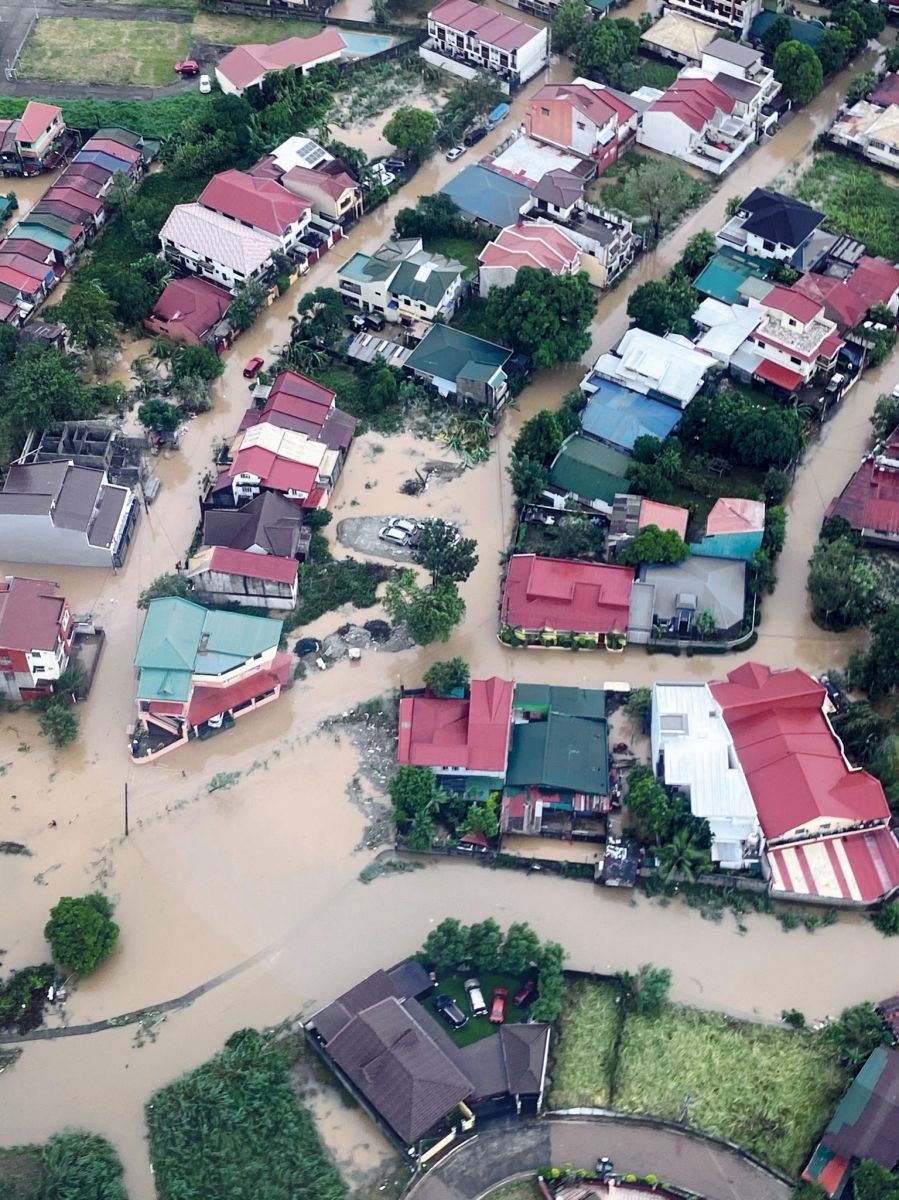
An aerial view of Marikina in the aftermath of Typhoon Vamco. (Photo provided by Lin Fu-yi)
A bird’s-eye view of eastern Metro Manila, the Philippines, revealed streets along the Marikina River inundated in muddy waters. Overly abundant rainfall brought by Typhoon Vamco, coupled with released reservoir water, had caused severe flooding in the region. "Looking out from a third-floor vantage point, only buildings taller than one story could be seen; the rest were submerged in flood water," according to reports from Tzu Chi volunteers in Marikina. They reported that people who had not evacuated in time were forced to retreat to the rooftops overnight to escape the rising flood waters.
Between September and November 2020, the Philippines were hit by a seemingly endless streak of typhoons and tropical depressions—ten of them in all. On November 1, Super Typhoon Goni, the world’s strongest storm in 2020, slammed into the country at 225 kilometers per hour (140 miles/hour), severely damaging the Bicol region in southern Luzon. Despite the raging pandemic, Tzu Chi volunteers in Manila quickly mobilized to assess damage. Six volunteers were dispatched to Albay Province, a hard-hit area in Bicol. Joining local volunteer Antonio Tan (陳華民), they conducted a work relief program in the city of Tabaco through which typhoon victims cleaned up their own homes and communities in exchange for cash from Tzu Chi.
Volunteers were still organizing relief work for Typhoon Goni when Typhoon Vamco hit on November 10, a mere ten days later. The Metro Manila area was badly pummeled this time around.
"Flooding in the aftermath of Vamco was even worse than that after Typhoon Ketsana in 2009," said Henry Yunez (楊國英), CEO of Tzu Chi Philippines. "Many areas that had not been flooded before were inundated this time." Typhoon Vamco hit the national capital of Manila and other areas after making a landfall on the eastern side of Metro Manila. Marikina in Metro Manila and San Mateo in Rizal were among the areas hit hard by the flash floods triggered by the typhoon.
As can be expected, the receding floodwaters revealed a staggering mess. Debris hung from utility poles and tree branches, thick layers of sludge covered the streets, and homes were inundated with mud, inside and out. Residents piled their damaged furniture and other household items onto the streets, adding to the devastated look of the affected cities and towns.
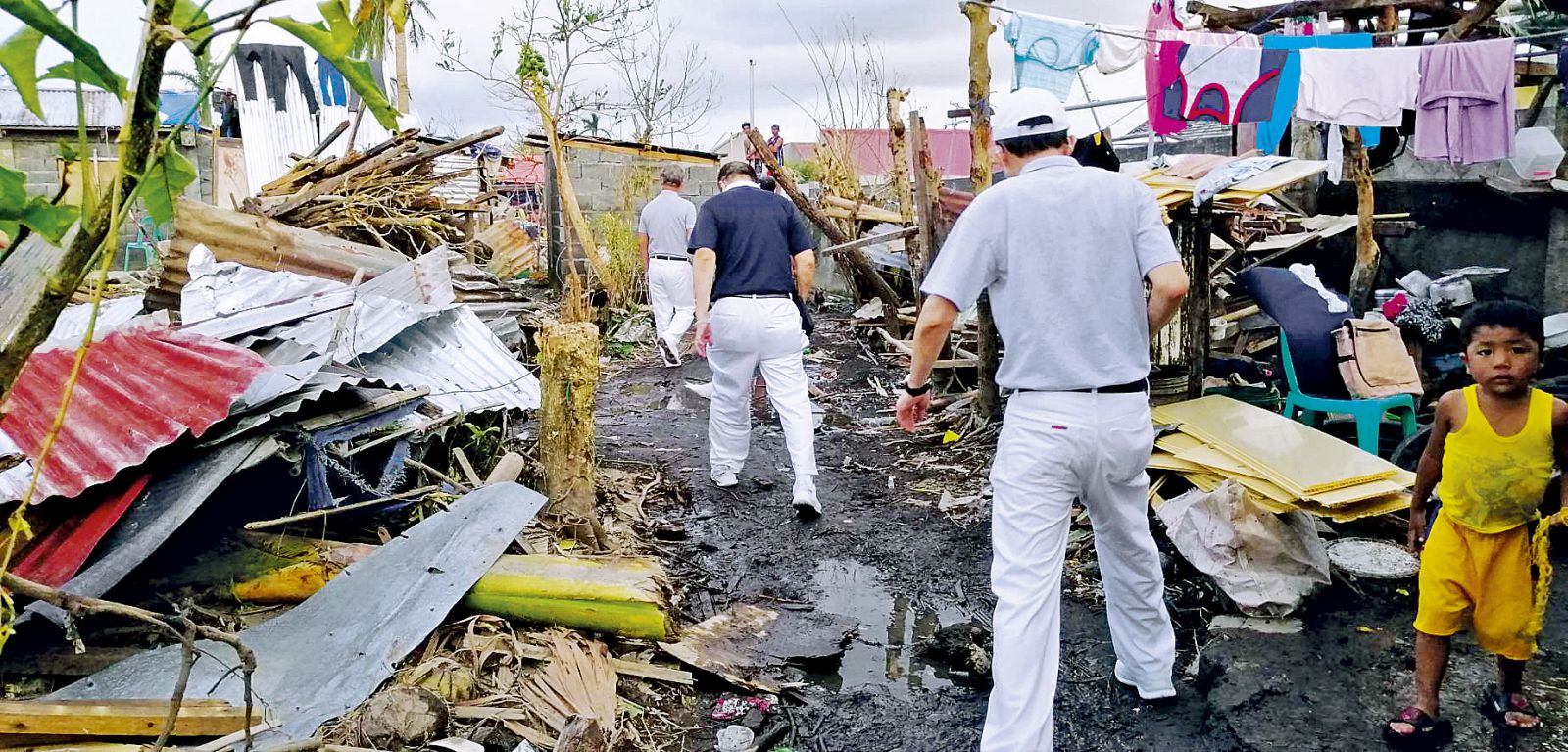
Volunteers assess damage in Tabaco, Albay, where Typhoon Goni has wreaked havoc. (Photo by Huang Liang-liang)
Work Relief for Triple the Pay
The two typhoons left a trail of damage in the central and southern parts of Luzon Island. Poor sanitation in the flooded areas would soon compound the actual damage from the flood, so it was essential to clean up immediately. The disaster areas were huge and it was too big of a job to be left to the government alone. Volunteers decided that helping residents clean up in the aftermath was the best way to speed up the recovery in the flooded areas. They split into multiple teams to assess the damage in disaster areas, then organized cash-for-work cleanup programs in Marikina, San Mateo, and the Province of Albay.
The programs were launched concurrently on November 14, just four days after Typhoon Vamco had made landfall. Participants were tasked with cleaning up their own homes and the streets in their own communities, for which Tzu Chi compensated them with a thousand pesos (US$21) each day. Though that was about three times the average local daily pay, they were following the instructions of Master Cheng Yen to do all they could to help people suffering from the double whammy of the pandemic and the typhoons.
Many residents in Marikina were already familiar with Tzu Chi. When Typhoon Ketsana battered the city 11 years ago, Tzu Chi volunteers quickly offered work relief programs there, also to clean up the streets and homes in victimized communities. Foundation volunteers have continued to work in those communities ever since.
The cleanup events back then were a lot bigger and could log a thousand participants, but they were of a smaller scale this time, about 400 people per event. This was a constraint made necessary by the pandemic. At each event, volunteers informed the participants that they were able to receive one thousand pesos for each day they worked thanks to the generosity of loving donors around the world.
It was essential to have proper trucks and earth-moving equipment to efficiently clear away the debris. The government provided some machinery to help, but it wasn’t enough to handle the task, so volunteers scrambled to round up more. Participants also brought whatever personal work tools they could.
One act of goodwill begets more, and that was true in this situation as well. Earlier in the month, Tzu Chi volunteers had implemented a similar cash-for-work program in Batangas Province after Typhoon Goni had wreaked havoc there. Now a group of residents who had taken part in that program and received a timely infusion of money from Tzu Chi in exchange for cleaning up their own community had arrived in Marikina, ready to lend a hand. They wanted to demonstrate their gratitude to Tzu Chi and pay forward their love by helping victims of Typhoon Vamco restore their homes. "I finally understand why some people say it’s better to give than to receive," said Patrick Arman, one of the helpers from Batangas, during a brief break from work.
Fema dela Rosa, 58, a resident of Malanday in Marikina, cried when she received a thousand pesos at the end of a workday. "We spent almost a whole day on our rooftop during the typhoon," she said. "The water ran rapidly below us, washing all our possessions away. The only thing we had left was the clothes on our backs." With the cash-for-work pay in hand, she could finally go buy some daily essentials.
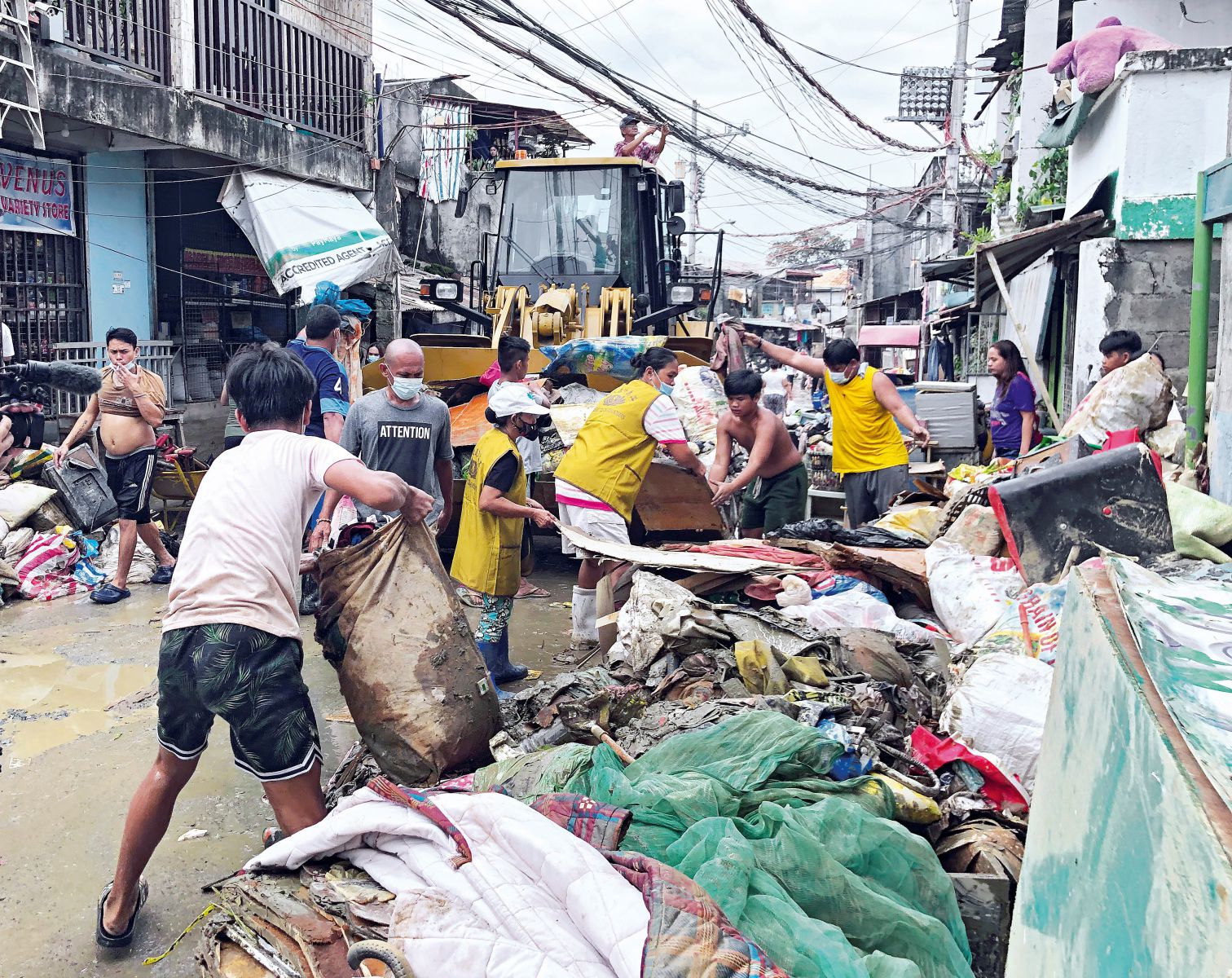
In the aftermath of Typhoon Vamco, San Mateo residents clean up their own homes and communities in a work relief program sponsored by Tzu Chi. (Photo by Yang Bi-fen)
Local Help
At the same time work was proceeding in Marikina, another group of Tzu Chi volunteers had organized additional cleanup and relief work in Albay Province. Areas in that province had suffered varying degrees of damage from Typhoon Goni. Some communities there had an urgent need to clear away volcanic ash slides while others had been hit so badly by mudslides that residents had been forced into shelters.
Because so many Tzu Chi volunteers in Manila were tied up dealing with the damage from Typhoon Vamco, only a small team of seven were available to help typhoon victims in Albay Province. The seven volunteers knew that they alone could not do the job well. Acting on Master Cheng Yen’s suggestion, they worked to mobilize local residents to help when they arrived at the area.
On November 13, the small cadre of volunteers spread out to different areas in Albay Province to hold informational sessions about the relief work Tzu Chi was carrying out in the area. Such efforts proved fruitful; they successfully recruited more than a hundred additional volunteers. The local helpers were divided into 29 groups, who then fanned out to visit 49 villages in six towns. Their task was to assess damage and compile rosters of families for the cash distributions Tzu Chi was holding to help typhoon victims.
At the same time recipient rosters were being created, volunteers initiated a work relief program in Camalig, a town that had been hit hard by mudslides of volcanic ash. Before Typhoon Goni hit, some families in the town had purchased seasonal products to sell for the Christmas holidays, trying to bolster incomes hurt by the pandemic. Sadly, their stock of purchased goods was completely wiped out by the typhoon, leaving them in even worse financial shape. The money they earned through Tzu Chi’s work relief program would be a big help to them.
On the last day of the program at Camalig, volunteers noticed a teenager leaning on a crutch by a post. He looked forlorn as he took in the on-going cleanup activity around him. Volunteers talked to him and learned that his name was Reynan Brioso, age 15. He had trekked earlier that morning for three hours to reach Ilawod, the site of the cleanup that day, intending to take part in the event. But when he arrived at 9:00 a.m., the sign-up period had ended and the cleanup had already begun.
Brioso, one of 14 children in his family, had been born with a congenital defect in his right leg. The shy youngster told volunteers his asthmatic mother had not taken medicine for her condition for two months because they couldn’t afford it. They desperately needed money to purchase medicine for her. Seeing his need and moved by compassion, volunteers invited him to help a cooking team prepare lunches for program participants. Brioso helped out by cutting vegetables and serving food to participants. At the end of the day, he received a thousand pesos for his service that he could take home to his family.
Alberto Manatlaw and his wife were also participants in dire need of the work relief pay. The couple’s eldest son, Riovans, 19, had been blind since birth. This family of six had nothing to live on after the typhoon. "Typhoon Goni left our entire village covered in mud and boulders," Alberto explained. He and his wife were grateful for the opportunity to work for pay with which they could provide essentials for their family. Their son Riovans, though blind, also helped clean up their home.
More than 2,000 shifts were logged during the three-day work relief program in Camalig, or about 700 people per day. The mayor of Camalig, Carlos Irwin G. Baldo, Jr., came to the event venue on the last day to thank the foundation with a certificate of appreciation. "Although this certificate is just a thin piece of paper," the mayor said, "the sincerest gratitude of our entire town is behind it. Thank you for giving us the motivation to restore our homes."
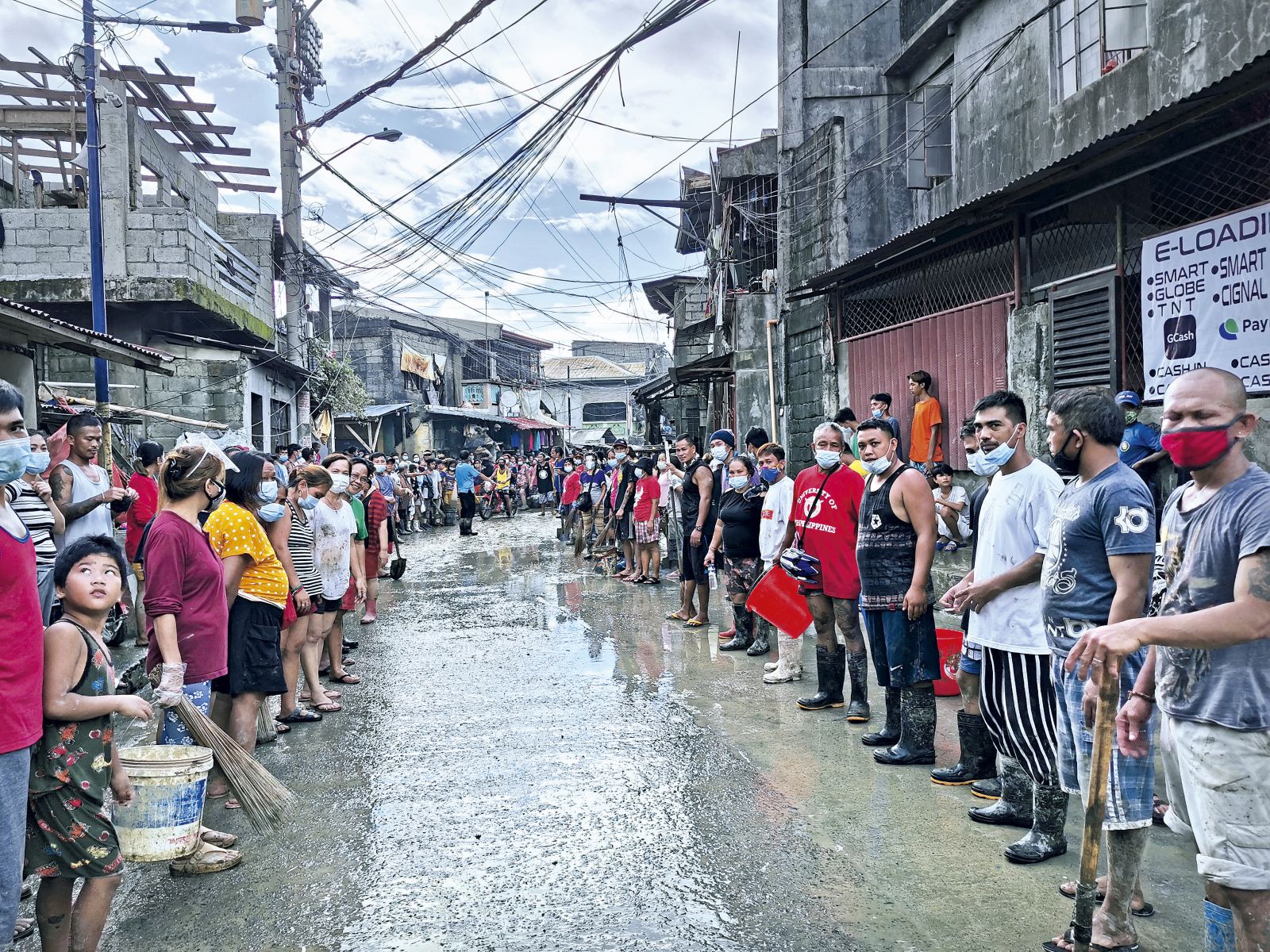
Work relief participants wait for their pay after cleaning up the streets of San Mateo. (Photo by Guo Jia-Jiang)
Relief Cash at Three Banks
Tzu Chi followed the cash-for-work programs with aid distributions in some of the most severely damaged areas. Such distributions benefited more than 57,000 families.
The first wave of distributions was conducted in Albay Province. For four days beginning on November 18, Tzu Chi volunteers and local helpers worked in six towns in the province to distribute claim checks. Volunteers first verified the identity of each recipient and, depending on their family size, stamped a claim check one to three times—the more seals were affixed, the more cash a family could receive. The recipients could then go to one of three banks to exchange their claim checks for money. The amount they received ranged from 18,000 to 28,000 pesos (US$375 to $583).
The day after the distributions, the three banks that worked with Tzu Chi started to accept the claim checks and give out cash accordingly. Some aid recipients lived in areas farther away from the banks, so they slept in front of the banks the night before the cash was to be given out. They wanted the money provided by Tzu Chi in their hands as quickly as possible the next morning; they couldn’t wait to use the money to start rebuilding their lives.
Wilfredo Rosero, clutching his claim check tightly, said, "The money from Tzu Chi will greatly help many people, especially people like me whose homes were totally destroyed in the typhoon. Receiving this is like receiving hope." Another recipient, Rosilyn Valdez, said, "Life is hard, really hard. I often cry because I’m the only one left in my family to take care of my ailing mother…. I couldn’t believe we’d receive so much money from Tzu Chi. I can now use it to buy medicine for my mother."
Metro Manila
In Metro Manila, volunteers worked hard to get cash aid to victims by Christmas. Some volunteers even gave up a full night of sleep to get the recipient rosters ready before the distributions so that the events could be held on schedule. When all was set, volunteers split into 14 groups to distribute claim checks or debit cards in Marikina and San Mateo to 40,000 families. The events began on December 8 and lasted for four days.
Many people on the rosters had thought they would be receiving relief goods at the distributions. When they arrived at a venue and learned that each household would be getting 15,000 to 25,000 pesos (US$312 to $520) instead of relief goods, they were so happy they broke into applause. Some even cried tears of joy. Volunteers couldn’t help shedding a few tears too.
Many typhoon victims had been out of a job due to the pandemic. When the typhoons aggravated their financial struggles, they had no choice but to take out loans at exorbitant interest rates to pay their living expenses. Now they were feeling the pressure from having to make the interest payments. The money from Tzu Chi really lifted their spirits.
Ariel Saysan was an example. He was months behind on his rent when the floods triggered by Typhoon Vamco submerged the first floor of his place. At his wits’ end, he took out a loan to support his family. He was so strapped for cash it was easy to imagine his happiness when he learned he’d receive 25,000 pesos from Tzu Chi at the distribution. He was so grateful that he couldn’t stop thanking the foundation.
Genova Lagos, 66 and a stroke survivor, had a disabled son and four grandchildren that a deceased daughter had left behind. The family hurried to a shelter when Typhoon Vamco hit. They returned home the following day, when the water had receded, only to find that the second floor of their home had collapsed. Everything they owned was soaked in mud. They didn’t even have any food and had to subsist for days on what their neighbors could give them. When Lagos arrived at a Tzu Chi distribution, he couldn’t believe he was receiving cash from the foundation. He had only one thought in mind: "I can finally repair my house."
Aida de Guzman, a Tzu Chi volunteer in Marikina, recalled her experience during Typhoon Vamco. She said that standing water started to form in Tumana, her neighborhood, at four o’clock in the morning that day. She reached for her backpack, which contained her Tzu Chi uniforms, and began to contact other volunteers so that they could go to help at a shelter. However, the rising water prevented her from even making it to the shelter. She ended up working with others to strip wood pieces from window frames so that they could make steps for people to escape to higher places. It wasn’t until six o’clock in the evening, when the flood had subsided a bit, that they could come down.
Like others, Aida de Guzman was a typhoon victim, but she disregarded her own situation to work hard with other volunteers to help fellow victims. When Tzu Chi was finally distributing aid to survivors a month after the typhoon, she was so happy she cried. She was happy because meaningful relief was being given to those badly in need. When asked if she had received cash from the distribution, she said no. She pointed out that it was enough that her daughter’s family had received the aid. She said she was easily contented, and that she had learned the virtue of contentment in Tzu Chi. "Master Cheng Yen is very compassionate. She has really helped many people this time around," she said. "I’m old, but I’ll go anywhere where help is needed. I hope that the Master will give me strength so that I can work for Tzu Chi until my last breath."
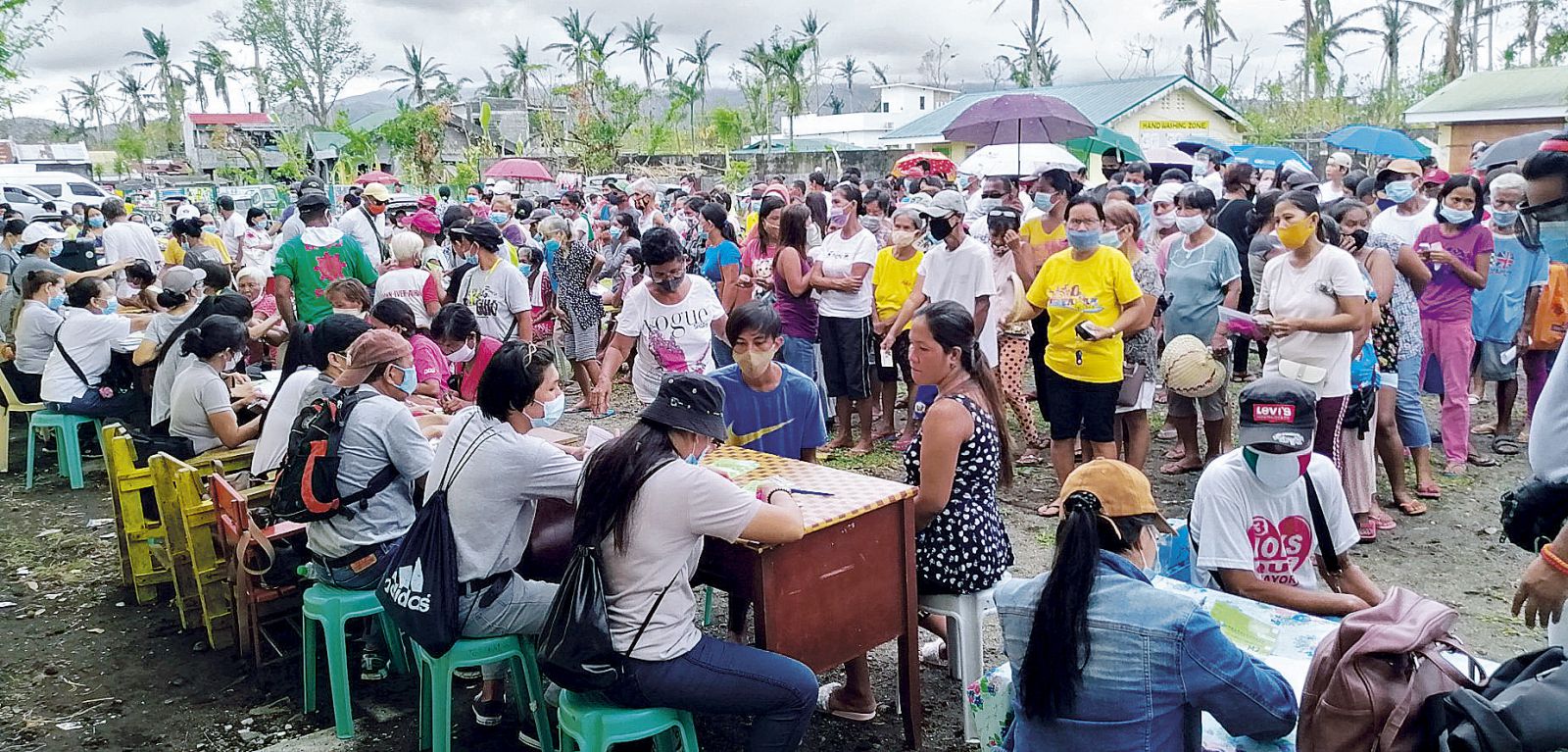
More than a hundred residents in Albay Province helped Tzu Chi compile recipient rosters and carry out distributions of relief cash so that typhoon victims in their communities could receive the help they needed as soon as possible. (Photo by Huang Liang-liang)
Recovery
"I wish to thank Tzu Chi on behalf of the 50,000 residents in Tumana," said Ziffred A. Ancheta, leader of the district. "I first witnessed the love and care of Tzu Chi volunteers the year Typhoon Ketsana hit. Now, 11 years later, Tzu Chi is still here with us. I’m very grateful. Due to the guidance of Tzu Chi volunteers, our residents have even learned to love each other more and be more proactive in helping others." His statement was supported by the generous outpouring of donations from aid recipients at the distributions. Many residents donated their spare change to Tzu Chi—they said the love of Tzu Chi had moved them into taking action to help others.
The mayor of Marikina, Marcelino R. Teodoro, had initially planned to attend just four of Tzu Chi’s distributions, but what he saw at the first two distributions touched him so much that he decided to cancel all his other appointments for the rest of the day so that he could visit all ten distribution venues. Everywhere he went, he reminded recipients that they should wisely spend the money that they had received from Tzu Chi. They should use the money on their families, not on tobacco, alcohol, or gambling.
Tzu Chi Philippines CEO Henry Yunez shared some information with recipients. He said that Master Cheng Yen had called on Tzu Chi volunteers around the world to pray for the Philippines. He also said that people in more than 20 countries and areas had donated money to help the typhoon victims in the country, including needy people in Sri Lanka and Syrian refugees in Turkey. "I sincerely hope that all of you will cherish this outpouring of love and share your blessings with those who need help even more."
Some aid recipients used the cash from Tzu Chi to reopen their shops, others to buy food or repair their homes. Commerce and business activities began to return to affected areas as people worked hard to rebuild their lives and prepared to usher in a new year. "I hope I can get our house repaired before Christmas so that my family and I can spend the holidays at home," said Rex Den Padin. "I’m really thankful to all the people who donated money to help us."
Contact Us | Plan a Visit | Donate
8 Lide Road, Beitou 11259, Taipei, Taiwan
886-2-2898-9999
005741@daaitv.com
©Tzu Chi Culture and Communication Foundation
All rights reserved.
